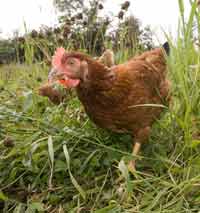Poultry science heading for crisis, warns researcher

Poultry research in the UK is heading for crisis because of a serious shortage of young people specialising in poultry science.
This was the warning by University of Edinburgh researcher Murdo MacLeod at the Temperton Fellowship lecture in London earlier this week, where he presented his report looking at the importance of research and development.
Recent years have seen the globalisation of the poultry sector and it is now a huge industry. “For every person in the world, there are 16 broilers and nearly one layer bird.” Mirroring this has been the globalisation of poultry research.
Dr MacLeod is the editor-in-chief of British Poultry Science journal, and 50 years ago about 90% of the papers submitted were from UK research centres. Now the UK only accounts for 8%, with China being the biggest submitter with 14% of papers.
However, only 34% of Chinese papers are currently accepted for publication, while it’s 74% for UK papers. This shows the difference in quality, but this gap is closing and the sheer number submitted means more are being published.
“There has been a big shift in where science is carried out in the world and the overseas poultry industry will be better supported by science as the quality of science overseas continues to improve,” he said.
It’s not just the location that has changed, subjects have also changed over the years. For example, work on feed enzymes peaked in the 1990s and is now starting to tail off while research into genetics and genomics continues to grow.
He highlighted that there was a slight problem in the attitude to research in the UK. “There is an element of scientific snobbery.”
There has been a recent tendency in society to look down on people who actually make and grow things. And this has extended to research with applied research being viewed less favourably than fundamental, blue sky research.
This is crucial as a questionnaire survey of the industry carried out by Dr MacLeod revealed that the less fashionable, applied research in areas like nutrition was just as crucial to the industry.
One positive message from the his questionnaire was that “British is best”, with many companies recognising the high quality of work. However, there was a warning in the responses that companies are already doing research abroad because of the high cost and lack of subject coverage.
He pointed to the move some years ago to full cost recovery, such as library use, administration and other overheads. “This means the basic cost is more than doubled while in Australia, research centres will take on this work if it is self-funding.”
Another concern is the increasing age of scientists with a serious shortage of young people specialising in poultry science. “They may be put off by the negative perception of industry. However, there are real opportunities for UK poultry scientists in influencing global welfare and quality standards.”
He added: “The industry has to act on this and portray a positive image of sector to persuade people that not everything about agriculture is bad and is a good career.”
